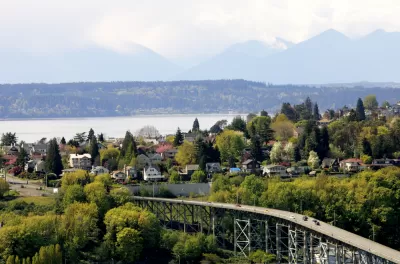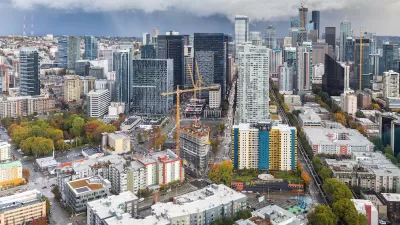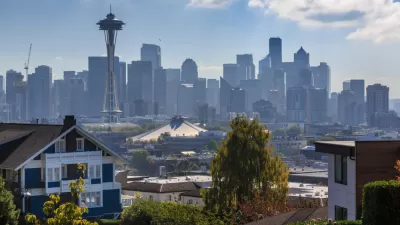Seattle's suburbs are no longer leading the region in housing construction, even as Seattle's urban core is building more housing than ever.

Mike Rosenberg reports on the regional housing market in Seattle, where suburban housing construction has slowed considerably, especially compared to the record-setting pace of building taking place in the more urban, central areas of the region.
The region's suburbs are no longer producing housing at a rate commensurate with the suburban share of the region's population. "Overall, Seattle housing construction has grown 130 percent this decade compared to the average over the prior three decades, while housing development in the suburbs has dropped 43 percent from its historical average," reports Rosenberg. The decline of suburban housing means housing production is declining for the region as a whole—that despite steady development in Seattle producing what some are describing as a glut in the rental market.
"The shift is the result of a combination of developers chasing the biggest profits in Seattle – where housing demand has gone through the roof, and city leaders have opened the floodgates for bigger buildings – and suburbs restricting new construction through zoning laws that all but ban new housing in most parts of the region," according to Rosenberg.
The feature-length coverage of the regional landscape for housing development includes a lot of data visualizations and additional means of putting the suburban housing slow down in perspective.
FULL STORY: Housing construction in local suburbs is at historic lows, while Seattle is setting records

Alabama: Trump Terminates Settlements for Black Communities Harmed By Raw Sewage
Trump deemed the landmark civil rights agreement “illegal DEI and environmental justice policy.”

Planetizen Federal Action Tracker
A weekly monitor of how Trump’s orders and actions are impacting planners and planning in America.

Why Should We Subsidize Public Transportation?
Many public transit agencies face financial stress due to rising costs, declining fare revenue, and declining subsidies. Transit advocates must provide a strong business case for increasing public transit funding.

Understanding Road Diets
An explainer from Momentum highlights the advantages of reducing vehicle lanes in favor of more bike, transit, and pedestrian infrastructure.

New California Law Regulates Warehouse Pollution
A new law tightens building and emissions regulations for large distribution warehouses to mitigate air pollution and traffic in surrounding communities.

Phoenix Announces Opening Date for Light Rail Extension
The South Central extension will connect South Phoenix to downtown and other major hubs starting on June 7.
Urban Design for Planners 1: Software Tools
This six-course series explores essential urban design concepts using open source software and equips planners with the tools they need to participate fully in the urban design process.
Planning for Universal Design
Learn the tools for implementing Universal Design in planning regulations.
Caltrans
Smith Gee Studio
Institute for Housing and Urban Development Studies (IHS)
City of Grandview
Harvard GSD Executive Education
Toledo-Lucas County Plan Commissions
Salt Lake City
NYU Wagner Graduate School of Public Service





























